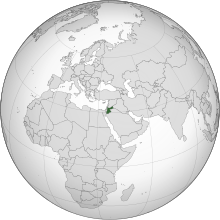
Back معاملة المثليين في الأردن Arabic LGBT práva v Jordánsku Czech Homosexualität in Jordanien German Diversidad sexual en Jordania Spanish Droits LGBT en Jordanie French זכויות להט"ב בירדן HE Diritti LGBT in Giordania Italian Sytuacja prawna i społeczna osób LGBT w Jordanii Polish Direitos LGBT na Jordânia Portuguese LGBTQ prava u Jordanu Serbo-Croatian
LGBTQ rights in Jordan | |
|---|---|
 | |
| Status | Legal since 1951 |
| Gender identity | Medical Responsibility Law is ambiguous about who can undergo sex reassignment surgery |
| Discrimination protections | None |
| Family rights | |
| Recognition of relationships | No recognition of same-sex couples |
Lesbian, gay, bisexual, and transgender (LGBTQ) individuals in Jordan face legal challenges and discrimination not experienced by non-LGBT persons.
Same-sex sexual activity was illegal in Jordan under the British Mandate Criminal Code Ordinance (No. 74 of 1936) until 1951 when Jordan drafted its own penal code which did not criminalise homosexuality, after having gained independence in 1946.[1] Despite the absence of explicit laws that criminalize same-sex relations, the combination of vague morality laws, public hostility, and the absence of legal protection, gives license to security forces and private individuals to target LGBT people with impunity.
According to 2023 Human Rights Watch report, Jordan’s "cybercrime" and "morality" laws have been used to persecute LGBT people. Security forces intimidated LGBT activists with threats of violence, arrest, and prosecution, forcing several activists to shut down their organizations, discontinue their activities, and in some cases, flee the country.
In August 2023, Jordanian authorities promulgated a new cybercrime law that threatens internet users’ right to anonymity, and includes provisions that could be used by authorities to target digital content around gender and sexuality, as well as individuals who use digital platforms to advocate for the rights of LGBT people. An anonymous activist told Human Rights Watch that the new law will “destroy all forms of LGBT expression online” and intensify “interference in people’s private lives.” One of the few LGBT rights activists who has remained in Jordan described her current reality: “Merely existing in Amman has become terrifying. We cannot continue our work as activists, and we are forced to be hyperaware of our surroundings as individuals.”[2][3]
- ^ "قانون العقوباترقم 16/1960وجميع تعديلاتهوالمنشور في الجريدة الرسمية رقم 1487تاريخ 1/1/1960والمعدل بآخر قانونرقم 8/2011والمنشور في الجريدة الرسمية رقم 5090تاريخ 2/5/2011" (PDF). Retrieved 29 April 2021.
- ^ "Jordan: Security Forces Target LGBT Activists". hrw.org. 4 December 2023. Retrieved 4 December 2023.
- ^ "Annex: Laws Prohibiting or Used to Punish Same Sex Conduct and Gender Expression in the Middle East and North Africa" (PDF). Retrieved 18 May 2021.